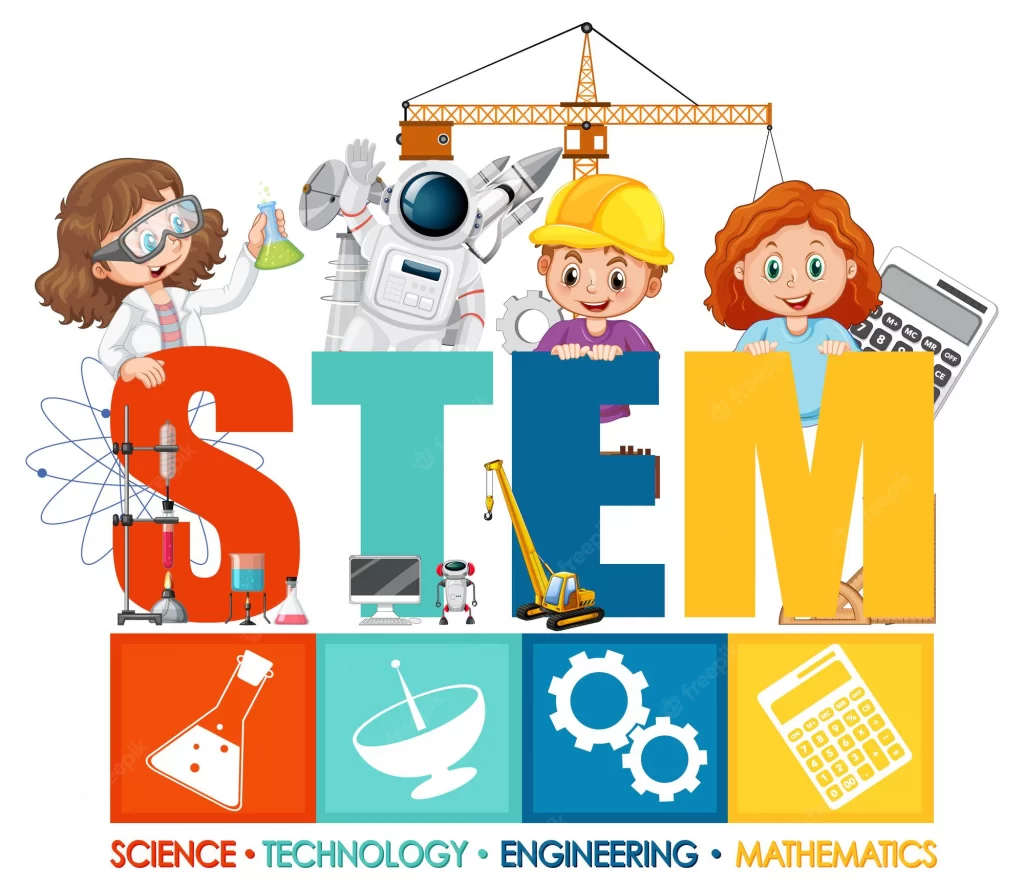5 Powers of STEM Based Education and How They Will Shape the Future

Image Source: Freepik
Have you thought of the Powers of STEM Based Education and what it offers learners who are introduced to it? STEM Based Education lays a solid foundation for an amazing journey in education. Learners who are taking through STEM Based Education will reap greater benefits in the long run.
African countries are still behind in the adoption of STEM education. The current block and mortar, board and chalk approach is saddled with many cahllenges.
The world is changing at an ever-quicker pace, and it’s leaving many behind. According to a survey conducted by the Collage of the Future, it’s predicted that by the year 2040, almost half of the jobs in the world will require people to have a background in STEM (Science, Technology, Engineering or Math-based) subjects. This is a worrying trend, as the world needs innovators and problem solvers to face the challenges of tomorrow and to ensure that the future can be better than the past. There are many benefits of educating our youth in STEM subjects, including the fact that it will help prepare the future workforce for the jobs of the future, reduce their susceptibility to automation, and increase their earning potential in the long run. But this doesn’t mean that every child should be made to study STEM subjects. The following article lists 8 real and important reasons why you should give your child an education in the sciences.
STEM Based Education Will Accomplish 3 Important Goals
The first benefit of STEM education is that it will create a more informed citizenry. The rise of misinformation, fake news, and conspiracy theories are threatening the ability of the public to understand controversial topics and make informed decisions. A STEM education will go a long way in ensuring that people have the facts they need to make decisions that affect their health, the environment, and their communities. Another benefit of STEM education is that it will help you compete on a global stage. In this age of globalization, it’s important that countries collaborate and work together. STEM students, however, are trained to think critically, collaborate, and find solutions to complex problems. STEM also helps you think outside of your own country, and this is an important skill to have in today’s interconnected world.
STEM Based Education Will Address Global Challenges
In order to address global challenges, like climate change, you must understand the facts and data behind them. Science is a way of understanding the world around us, and it’s the best way to find solutions to many of the problems we are facing today. STEM education will equip your child with the skills to analyze, interpret, and communicate data in a way that will go a long way in helping them solve some of the world’s toughest challenges. STEM also provides you with a leg up in the job market. STEM-based jobs are expected to grow at double the rate of non-STEM jobs. As STEM jobs continue to grow, there will be an ever-increasing demand for STEM-educated individuals. This means that STEM graduates will have a higher earning potential than those without a STEM background.
READ: 2021 NSMQ finalist fail to arrange the Digestive system in Dubai
Help Build Resilience
Another reason why you should give your child an education in STEM subjects is that it will help build their resiliency. STEM students, because they are expected to take on more challenging courses, are forced to push themselves and face adversity. STEM subjects encourage students to ask questions and challenge the status quo. While this can be challenging, it will help your child to grow as an individual and become more confident in their ability to excel with difficult tasks. It will also help them become more resilient in the face of failure.
Help Build Emotional and Social Intelligence
STEM education will also help your child to build their emotional and social intelligence. For example, STEM students have been shown to have higher self-esteem than their peers. This is likely due to the fact that STEM subjects encourage students to be more independent and think critically about the world around them. Students are also expected to collaborate and work together as part of their education, which also helps build their emotional and social intelligence.
Teach Your Child to Think Critically
STEM subjects encourage a critical analysis of the world around us. This is an important skill to have, as it will help your child to think outside the box and come up with innovative solutions to problems. STEM subjects also encourage students to challenge the status quo. This is an important skill to have in this day and age, as many industries are facing disruption from innovative technologies. If your child can learn to think critically and challenge what is currently the norm, they will be better prepared to adapt in a world that is ever-changing.
Help Your Child Develop a Growth Mindset
The last reason why you should educate your child in STEM subjects is that it will help them develop a growth mindset. A common misconception is that people with a STEM education are innately gifted. This is not the case. There are many examples of non-STEM majors who have gone on to become successful in their respective fields. What separates STEM majors, though, is their mindset. STEM students are trained to be persistent, self-disciplined, and determined. This makes them excellent candidates for a variety of industries, and it will help them succeed even if they don’t have a background in STEM subjects.
Conclusion
STEM based education is important for many reasons. It will create a more informed citizenry, help you compete on a global stage, address global challenges, build resiliency and help build emotional and social intelligence. STEM education will also help you build a growth mindset, which is important for success in any field. This is why STEM based education is so important for the future of our society. It is important that we educate our youth in STEM subjects so that they can meet the challenges of tomorrow and help make the future a better place than it is today.


 GES 2024-2025 Academic Calendar for Public Schools
GES 2024-2025 Academic Calendar for Public Schools  GES to recruit university graduates and diploma holders-GES Director General
GES to recruit university graduates and diploma holders-GES Director General  GES is expected to announce reopening dates for public schools today
GES is expected to announce reopening dates for public schools today  Dr. Bawumia’s Smart Phone Credit Will Take 125 Years To Repay: A Misleading Promise
Dr. Bawumia’s Smart Phone Credit Will Take 125 Years To Repay: A Misleading Promise  2024-2025 Report Card Grading, Student Attitudes, Interests and Conduct Samples for Teachers
2024-2025 Report Card Grading, Student Attitudes, Interests and Conduct Samples for Teachers  US Staffing Agencies Recruiting International Job Seekers With Work Visa Sponsorship
US Staffing Agencies Recruiting International Job Seekers With Work Visa Sponsorship  Buy 1 Gig MTN or Airtel Tigo data for only GHS6.00 not GHS17.00
Buy 1 Gig MTN or Airtel Tigo data for only GHS6.00 not GHS17.00